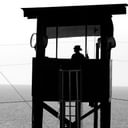By KATHARINE Q. SEELYE with SHERRI DAY
New York Times
Thursday, March 21, 2002
WASHINGTON, March 21 — Defense Secretary Donald H. Rumsfeld made public today the Bush administration’s rules for conducting military tribunals for prisoners from the Afghan war, opening the door for the United States to prosecute and possibly execute foreigners by a legal process not used since the Truman presidency after World War II.
Mr. Rumsfeld said the government had been working for months to find ways to conduct the tribunals, known as commissions, in a manner that is consistent both with America’s national security issues and with fairness and justice under American law.
“Let there be no doubt, commissions will conduct trials that are fair and impartial,” Mr. Rumsfeld said at a Pentagon news conference this afternoon. “At the same time, while ensuring just outcomes, the procedures are also designed to respond to the unique circumstances for which they were established.”
It is by design, Mr. Rumsfeld said, that the military tribunals will function in a manner that differs from both the federal court system and the military court system.
“The commissions are intended to be different, and the reason is because the president recognized that there had to be differences to deal with the unusual situation we face,” Mr. Rumsfeld said.
In establishing the rules, , the administration made concessions to critics who worried that President Bush’s original order on Nov. 13 that established such tribunals had codified a secret rigged system that could simply shuttle defendants to hasty deaths.
The rules now require a unanimous verdict by a seven-member panel for the death penalty, let the press cover most proceedings and provide for defendants to have military lawyers at government expense and also hire their own civilian lawyers at their own expense.
The rules also say suspects will be presumed not guilty and can see the evidence against them. They also require the highest standard of proof, saying that a tribunal can find someone guilty only beyond a reasonable doubt.
Officials said the rules on introducing evidence were looser than those in civilian courts, with hearsay allowed, as well as any evidence that would be convincing to a “reasonable person.”
The rules do not provide a process for independent appeals, a procedure that critics also sought, keeping control of the tribunals in the military chain of command.
In a surprise move, administration officials said they would invoke a rarely used presidential power to appoint civilians as temporary military officers to be judges on a review panel in lieu of an appeals court. The panel, appointed by Mr. Rumsfeld, would have three people, one of whom must have experience as a judge, either in civilian or military courts. If any judge is a civilian, the president would appoint the judge temporarily as a military officer, administration officials said Wednesday.
The power is allowed just in national emergencies, which administration officials said existed now. The president can appoint civilians as military officers up to the grade of major general for a period of up to two years.
Mr. Bush will have final review of the cases, although he has already called the prisoners to be tried “killers.”
“They don’t share the same values we share,” he has said.
Officials said the purpose of appointing civilians as military officers would be to keep the entire process in military control. The administration is trying to make certain that no part of the tribunals can slip into civilian courts.
The executive director of the Center on Law, Ethics and National Security at the Duke University Law School, Scott L. Silliman, said, “Once you open up review in an established court, you open up the specter of further appellate review.”
The administration has yet to determine a number of matters, including the sites of the tribunals, when they would start and who might be tried. Officials said the trials might not begin for several months, because investigators were still sifting through evidence obtained on the battlefield and were hitting a brick wall with prisoners who refuse to tell the truth.
This afternoon, Secretary Rumsfeld said locations for the trials had not been chosen because “we do not have any candidates yet to be tried before the commissions.”
Some administration officials said a likely setting for the trials would be the United States Naval Station at Guantánamo Bay, Cuba, because they would be shielded from the jurisdiction of United States courts.
That view is not a legal certainty, however, and the administration is wrestling with finding a locale that would afford the military the most control and prevent the federal courts from intervening in death penalty cases.
Top lawyers throughout the administration have been engaged in intense internal debate over the last four months about the rules to try the hundreds of prisoners at Guantánamo and in Afghanistan. Officials said on Wednesday that they had not decided what to do with those whom the military tribunals would not try, although Mr. Rumsfeld has said they could be held indefinitely or returned to their home countries if the United States received assurances that they would be punished.
Administration officials said their primary concerns were to safeguard classified information, provide security for court personnel, remain flexible as the war evolved and accommodate the broad range of evidence that they are gathering.
The administration was surprised by the strong reaction of even friendly lawyers to Mr. Bush’s original order. The administration has rejected requests from the American Bar Association and the National Institute of Military Justice that it provide a comment period on the rules, citing “the need to move decisively and expeditiously in the ongoing war against terrorism.”
But the administration did seek advice from outside experts, including Griffin B. Bell, a former attorney general; William T. Coleman, a Washington lawyer and transportation secretary in the Ford administration; Lloyd N. Cutler, a prominent Democratic lawyer; Martin R. Hoffman, a former Army secretary; Bernard D. Meltzer, a former prosecutor at the Nuremberg trials who is a professor at the University of Chicago; and Newton N. Minow, a former chairman of the Federal Communications Commission and longtime friend of Mr. Rumsfeld.
Mary Cheh, a professor of criminal procedure and constitutional law at George Washington University, said the administration appeared to have listened to some critics.
“Over all,” Professor Cheh said, “they’ve given ground on points that are fundamentally important. The openness and civilian attorney and proof beyond a reasonable doubt — that combination, even against a different evidentiary standard, is far more palatable and at the end of the day is within the range of reasonableness.”
The lack of an independent appeals process drew continued criticism today from human rights groups that otherwise commended the administration for providing defendants what they called fair considerations of due process.
Amnesty International said the lack of appeals gave “unfettered and unchallengeable discretionary power to the executive to decide who will be prosecuted and under what rules, as well as to review convictions and sentences.”
The rules call for an authority named by the defense secretary to appoint members of each tribunal, which will have three to seven members. Any tribunal hearing a case involving the death penalty has to have seven members.
The members would come from the ranks of military officers who are retired, reservists or on active duty. The appointing authority is to designate one as the presiding officer and is to be a judge advocate of any branch of the military.
The prosecutors are to be judge advocates or special trial lawyers from the Justice Department. The suspects can replace their military lawyers with another military lawyer, as well as have their own civilian lawyers, provided that the lawyer is an American citizen and cleared to receive secret information. When classified information is presented, the civilian lawyer may be excluded, but a military defense lawyer will always be present. The military may create a pool of qualified civilian lawyers.
The crimes the suspects may be charged with are crimes of war, as well as aiding the enemy and spying. The accused may present evidence at their trials and cross-examine witnesses for the prosecution. Conviction requires a vote of two-thirds of the tribunal. The death penalty requires a unanimous vote.
| Rules for Military Tribunals A comparison of some rules for military tribunals for terrorism suspects with courts-martial and civilian courts.
Sources: Administration officials (commissions); National Institute of Military Justice (courts-martial/ federal courts) |



